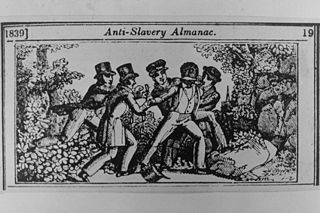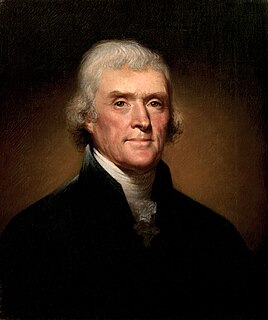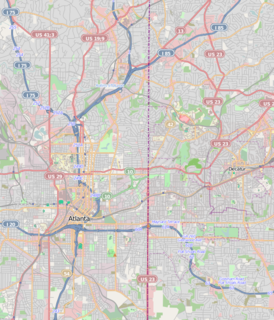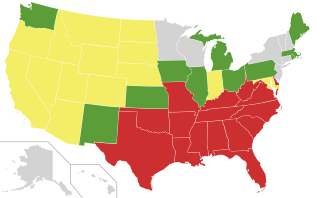
White trash is a derogatory racist and classist slur used in American English to refer to poor white people, especially in the rural southern United States. The label signifies a social class inside the white population and especially a degraded standard of living. It is used as a way to separate the "noble and hardworking" "good poor" from the lazy, "undisciplined, ungrateful and disgusting" "bad poor". Use of the term provides for middle- and upper-class whites a means of distancing themselves from the poverty and powerlessness of poor whites, members of a privileged class – whites – who cannot enjoy those privileges.

Rappahannock County is a county located in the Commonwealth of Virginia, US. As of the 2010 census, the population was 7,373. Its county seat is Washington. The name "Rappahannock" comes from the Algonquian word lappihanne, meaning "river of quick, rising water" or "where the tide ebbs and flows."
Loving v. Virginia, 388 U.S. 1 (1967), was a landmark civil rights decision of the U.S. Supreme Court in which the Court ruled that laws banning interracial marriage violate the Equal Protection and Due Process Clauses of the Fourteenth Amendment to the U.S. Constitution. Beginning in 2013, it was cited as precedent in U.S. federal court decisions holding restrictions on same-sex marriage in the United States unconstitutional, including in the 2015 Supreme Court decision Obergefell v. Hodges.

Mountain whites were white Americans living in Appalachia and the inland region of the Antebellum South. They were generally small farmers, who inhabited the valleys of the Appalachian range from western Virginia to northern Georgia and Alabama.

In 1924, the Virginia General Assembly enacted the Racial Integrity Act. The act reinforced racial segregation by prohibiting interracial marriage and classifying as "white" a person "who has no trace whatsoever of any blood other than Caucasian." The act, an outgrowth of eugenist and scientific racist propaganda, was pushed by Walter Plecker, a white supremacist and eugenist who held the post of registrar of Virginia Bureau of Vital Statistics.

Slave patrols—traditionally known as patrollers, patterrollers, pattyrollers or paddy rollers by enslaved persons of African descent—were organized groups of armed men who monitored and enforced discipline upon slaves in the antebellum U.S. southern states. The slave patrols' function was to police enslaved persons, especially those who escaped or were viewed as defiant. They also formed river patrols to prevent escape by boat.

The Paiute War, also known as the Pyramid Lake War, Washoe Indian War and the Pah Ute War, was an armed conflict between Northern Paiutes allied with the Shoshone and the Bannock against intruding settlers from the United States, supported by military forces. It took place in May 1860 in the vicinity of Pyramid Lake in the Utah Territory, now in the northwest corner of present US state of Nevada. The war was preceded by a series of increasingly violent incidents, culminating in two pitched battles in which 79 Whites and 25 Indigenous peoples were killed. Smaller raids and skirmishes continued until a cease-fire was agreed to in August 1860; there was no treaty.

Notes on the State of Virginia (1785) is a book written by the American statesman, philosopher, and planter Thomas Jefferson. He completed the first version in 1781 and updated and enlarged the book in 1782 and 1783. It originated in Jefferson's responses questions about Virginia posed to him in 1780 by François Barbé-Marbois, the Secretary of the French delegation in Philadelphia, the temporary capital of the United Colonies.
Macaca[mɐˈkakɐ] (feminine) and macaco[mɐˈkaku] (masculine) are the Portuguese words for "monkey". In Portugal and Portuguese-speaking countries, macaco is used as a racial slur against black people.
Disfranchisement after the Reconstruction era in the United States, especially in Southern states, was based on a series of laws, new constitutions, and practices in the South that were deliberately used to prevent Black citizens from registering to vote and voting. These measures were enacted by the former Confederate states at the turn of the 20th century. Efforts were made in Maryland, Kentucky, and Oklahoma. Their actions were designed to thwart the objective of the Fifteenth Amendment to the United States Constitution, ratified in 1870, which sought to protect the suffrage of freedmen after the American Civil War.
Pace v. Alabama, 106 U.S. 583 (1883), was a case in which the United States Supreme Court affirmed that Alabama's anti-miscegenation statute was constitutional. This ruling was rejected by the Supreme Court in 1964 in McLaughlin v. Florida and in 1967 in Loving v. Virginia. Pace v. Alabama is possibly the first recorded interracial sex court case in America.

Mutton Hunk Fen Natural Area Preserve is a 516-acre (2.09 km2) Natural Area Preserve located in Accomack County, Virginia. Fronting on the Atlantic Ocean's Gargathy Bay to the east, it is also bounded by Whites Creek and Mutton Hunk Branch to its north. The property contains a rare "sea level fen" community, one of only four in Virginia. Despite the proximity to the ocean's saltwater, freshwater wetland plants are able to survive in this environment due to the influence of freshwater springs. Acidic conditions also encourage the growth of plants normally found in bogs, in addition to tidal freshwater wetland plants; five of the species found at the preserve are regionally rare.

First Baptist Church was the first Baptist church in Petersburg, Virginia; one of the first African-American Baptist congregations in the United States, and one of the oldest black churches in the nation. It established one of the first local schools for black children in the nation.
Fort Henry was an English frontier fort in 17th century colonial Virginia near the falls of the Appomattox River. Its exact location has been debated, but the most popular one is on a bluff about four blocks north of the corner of W. Washington and N. South Streets in Petersburg.

The Wild and Wonderful Whites of West Virginia is a 2009 documentary film directed by Julien Nitzberg, chronicling the White family of Boone County, West Virginia.

Peoplestown is a neighborhood of Atlanta just south of Georgia State Stadium and Downtown Atlanta.

In the United States, anti-miscegenation laws were laws passed by most states that prohibited interracial marriage and interracial sexual relations. Some such laws predate the establishment of the United States, some dating to the later 17th or early 18th century, a century or more after the complete racialization of slavery. Most states had repealed such laws by 1967, when the U.S. Supreme Court ruled in Loving v. Virginia that such laws were unconstitutional in the remaining 16 states. The term miscegenation was first used in 1863, during the American Civil War, by journalists to discredit the abolitionist movement by stirring up debate over the prospect of interracial marriage after the abolition of slavery.

Whites Addition is an unincorporated community in Logan County, West Virginia, United States. Whites Addition is located along Island Creek and West Virginia Route 44 1 mile (1.6 km) southwest of Logan. It is part of the Mount Gay-Shamrock census-designated place.

Poor White is a sociocultural classification used to describe economically disadvantaged Whites in the English-speaking world.

The Johnson–Jeffries riots refer to the dozens of race riots that occurred throughout the United States after African-American boxer Jack Johnson defeated white boxer James J. Jeffries in a boxing match termed the "Fight of the Century". Johnson became the first black World Heavyweight champion in 1908 which made him unpopular with the predominately white audience of boxing. Jeffries, a former heavyweight champion came out of retirement to fight Johnson and was nicknamed the "Great White Hope". After Johnson defeated Jeffries on July 4, 1910, many whites felt humiliated and began attacking blacks who were celebrating Johnson's victory.

















